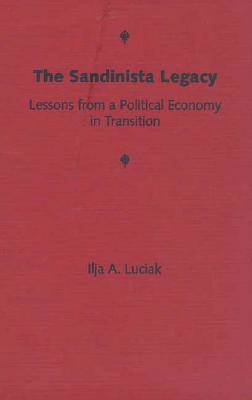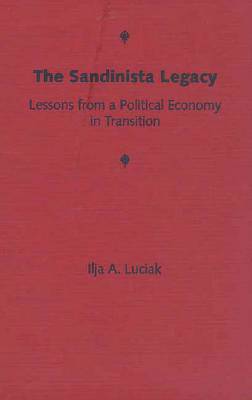
Bedankt voor het vertrouwen het afgelopen jaar! Om jou te bedanken bieden we GRATIS verzending aan op alles gedurende de hele maand januari.
- Afhalen na 1 uur in een winkel met voorraad
- Gratis thuislevering in België
- Ruim aanbod met 7 miljoen producten
Bedankt voor het vertrouwen het afgelopen jaar! Om jou te bedanken bieden we GRATIS verzending aan op alles gedurende de hele maand januari.
- Afhalen na 1 uur in een winkel met voorraad
- Gratis thuislevering in België
- Ruim aanbod met 7 miljoen producten
Zoeken
The Sandinista Legacy
Lessons from a Political Economy in Transition
Ilja A Luciak
Hardcover | Engels
€ 93,45
+ 186 punten
Omschrijving
"An original and carefully crafted piece of work. . . . Scholars and analysts working on Nicaragua will want this book."--Rose J. Spalding, DePaul University "Important contributions not only to the comparative literature of regime transitions (particularly 'post-socialist' transitions), but also to the study of Nicaragua and Central America. . . . Presents a nicely balanced picture of the Sandinista record of accomplishments and failures, including a well-reasoned analysis of who or what was to blame for the failures."--Richard Tardanico, Florida International University
When the Sandinistas came to power in Nicaragua, they promised to establish social and economic democracy. As Ilja Luciak tells us in this study of regime transitions, their legacy is mixed, though they deserve credit for institutionalizing electoral democracy. While they improved the life of the peasantry and achieved an impressive record in the areas of education and health, by 1990 their progress had been halted and in many instances reversed.
Luciak maintains that the Sandinistas' loss at the polls in 1990 was a blessing in disguise: after eleven years in power, the revolutionary movement needed time to rejuvenate itself and return to its popular roots. He examines the evolution of Sandinista democracy and analyzes Sandinista policies toward two rural grassroots movements, the Association of Rural Workers and the National Union of Farmers and Ranchers, showing the inevitable tension that results when a vanguard party attempts to strengthen participatory democracy. He also examines the development of the tiendas campesinas By focusing on the dilemma that confronts societies in transition, Luciak shows that the Sandinista experiment offers a valuable warning for the political elites and for the people of Eastern Europe and the successor states of the Soviet Union. The lesson is that the Sandinistas set out to establish a new model of democracy that emphasized economic justice and direct democracy; it wound up consolidating formal democracy. The price for the consolidation of formal democracy is paid by the poor majority, he says, and it is often too high.
Ilja A. Luciak is associate professor of political science at Virginia Polytechnic Institute and State University. He has published articles in such journals as Comparative Politics, Journal of Latin American Studies, and Latin American Perspectives.
When the Sandinistas came to power in Nicaragua, they promised to establish social and economic democracy. As Ilja Luciak tells us in this study of regime transitions, their legacy is mixed, though they deserve credit for institutionalizing electoral democracy. While they improved the life of the peasantry and achieved an impressive record in the areas of education and health, by 1990 their progress had been halted and in many instances reversed.
Luciak maintains that the Sandinistas' loss at the polls in 1990 was a blessing in disguise: after eleven years in power, the revolutionary movement needed time to rejuvenate itself and return to its popular roots. He examines the evolution of Sandinista democracy and analyzes Sandinista policies toward two rural grassroots movements, the Association of Rural Workers and the National Union of Farmers and Ranchers, showing the inevitable tension that results when a vanguard party attempts to strengthen participatory democracy. He also examines the development of the tiendas campesinas By focusing on the dilemma that confronts societies in transition, Luciak shows that the Sandinista experiment offers a valuable warning for the political elites and for the people of Eastern Europe and the successor states of the Soviet Union. The lesson is that the Sandinistas set out to establish a new model of democracy that emphasized economic justice and direct democracy; it wound up consolidating formal democracy. The price for the consolidation of formal democracy is paid by the poor majority, he says, and it is often too high.
Ilja A. Luciak is associate professor of political science at Virginia Polytechnic Institute and State University. He has published articles in such journals as Comparative Politics, Journal of Latin American Studies, and Latin American Perspectives.
Specificaties
Betrokkenen
- Auteur(s):
- Uitgeverij:
Inhoud
- Aantal bladzijden:
- 258
- Taal:
- Engels
Eigenschappen
- Productcode (EAN):
- 9780813013695
- Verschijningsdatum:
- 1/06/1995
- Uitvoering:
- Hardcover
- Formaat:
- Genaaid
- Afmetingen:
- 162 mm x 237 mm
- Gewicht:
- 594 g

Alleen bij Standaard Boekhandel
+ 186 punten op je klantenkaart van Standaard Boekhandel
Beoordelingen
We publiceren alleen reviews die voldoen aan de voorwaarden voor reviews. Bekijk onze voorwaarden voor reviews.











